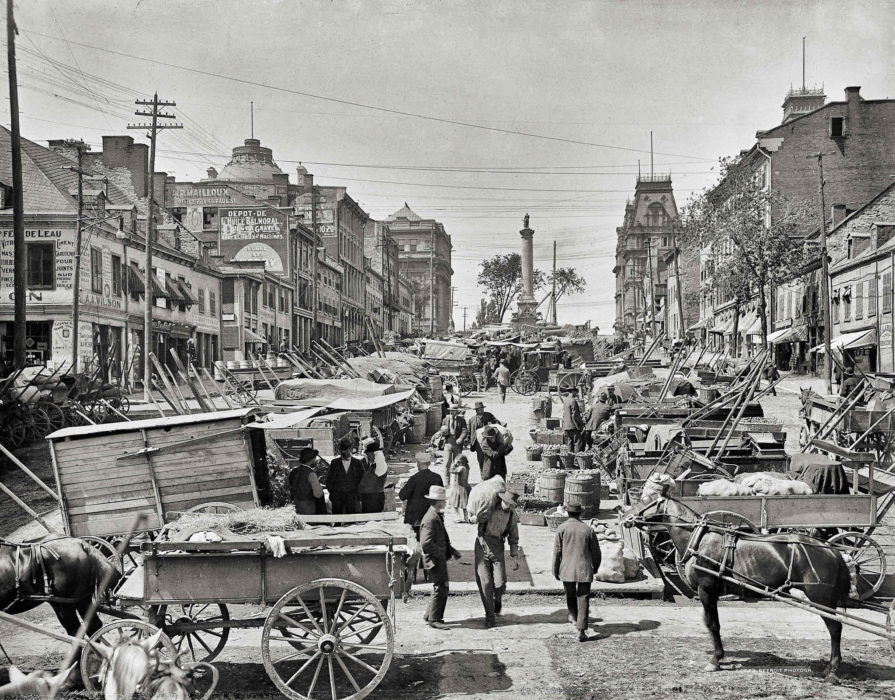OVER FIVE HUNDRED PEOPLE crammed into Montreal’s Coronation Hall on September 3, 1912, for a meeting of Montreal’s Socialist Club. They had come to hear ‘Abdu’l-Bahá speak on “The Economic Happiness of the Human Race,” wrote the Montreal Star, and “they seemed to represent almost every nationality under the sun.” The President of the association, Mr. H.A. Goulden introduced ‘Abdu’l-Bahá as “a great messenger of love and brotherhood from the East to the West.” Mahmúd-i-Zarqání noted that Goulden told the crowd that they would hear about “the principles of brotherhood, prosperity and the upliftment of the poor.”
It is very difficult in 2012 to think back before the modern welfare state, before the many self-proclaimed “socialist” states of the twentieth century, before the Russian Bolshevik revolution of 1917. We cannot be exactly sure what socialism meant to all five hundred gathered there that day, but it is safe to assume they shared a belief that the economic system in a newly industrial Canada contributed to the suffering of the poor.
The Star referred to the group as a “gathering of Socialists” and to Mahmúd they were the “Socialist Club.” The Canadian Socialist League, the Canadian Socialist Party, and the Canadian Social Democratic Party were all active in the city at that time. Canadian workers had organized into unions since the 1870s, which included the creation of “Labor Day” in 1872 as part of the campaign to bring the work week down to fifty-eight hours. But Socialism in Canada at this time was ill-defined, not necessarily associated with the union movement, nor even the working class. Its leaders were variously influenced by ideas of Christian brotherhood, Fabian socialism and perhaps smatterings of Marx. What they heard from ‘Abdu’l-Bahá, according to the Star, was a plan to help every individual enjoy “a right to live in comfort and happiness by sharing in the general welfare.”

‘Abdu’l-Bahá’s talk began with the statement that humans were not solitary creatures, but “ever in need of cooperation and mutual help.” He told the assembly that “God desired that each individual member of the body politic should live in the utmost comfort and welfare.” An absence of this was “a lack of symmetry in the body politic.”
The Star quoted ‘Abdu’l-Bahá’s characterization of “the selfish” who say “Let us look after ourselves. Let others die, so long as I am comfortable, everything is going well.” “Such a callous attitude,” he said, “is due to a lack of control and a lack of a working law.”
‘Abdu’l-Bahá then identified economic proposals that he explained were elaborated by his father Bahá’u’lláh in the late nineteenth century. ‘Abdu’l-Bahá introduced the idea of a “general storehouse” to which all members of society would contribute a percentage of their income “on a graded scale.” ‘Abdu’l-Bahá suggested rates of 0%, 10%, 20%, 25% and 50% for the poor on up to the rich. The papers referred to this concept as “tithes”—the idea of income tax did not come into place in Canada until 1917 as a “temporary measure” to aid the war effort. Of course, in a 1912 context, words like “tithe” and “tax” carried different connotations than today, and may be imprecise descriptions of ‘Abdu’l-Bahá’s message, especially as they were filtered through a journalist’s report.
The people “would elect trustees for the administration of the public trust,” explained ‘Abdu’l-Bahá, and from this “general storehouse” of funds, which would come from various sectors of industry—agricultural, resources, manufacturing, inheritance tax—“the less fortunate” would “secure their share of the general welfare.”
In 1912, such a system of social benefits for the poor had no equivalent in the Americas and it would be decades before “a working law” could put such programs into place in Canada. This was not socialism, since it involved no collective ownership of the means of production, and since it “upheld social distinctions,” noted the Star. It was also by no means the full extent of ‘Abdu’l-Bahá’s many talks on economics. The following night, he would elaborate further on spiritual dimensions of economics. But for tonight’s crowd, these novel ideas generated such applause that, in the words of Mahmúd, “the walls of the building seemed to vibrate to their foundations.”






